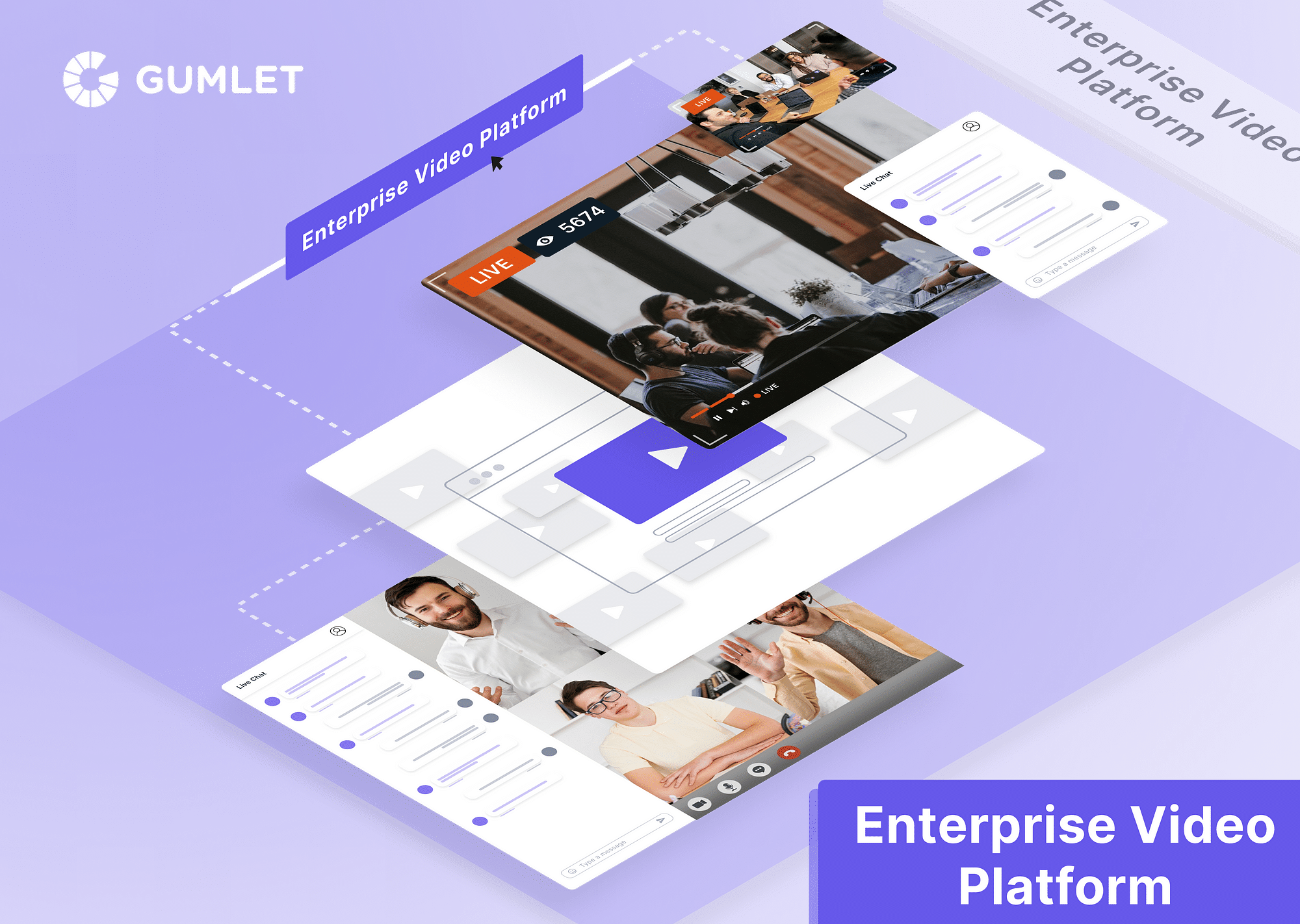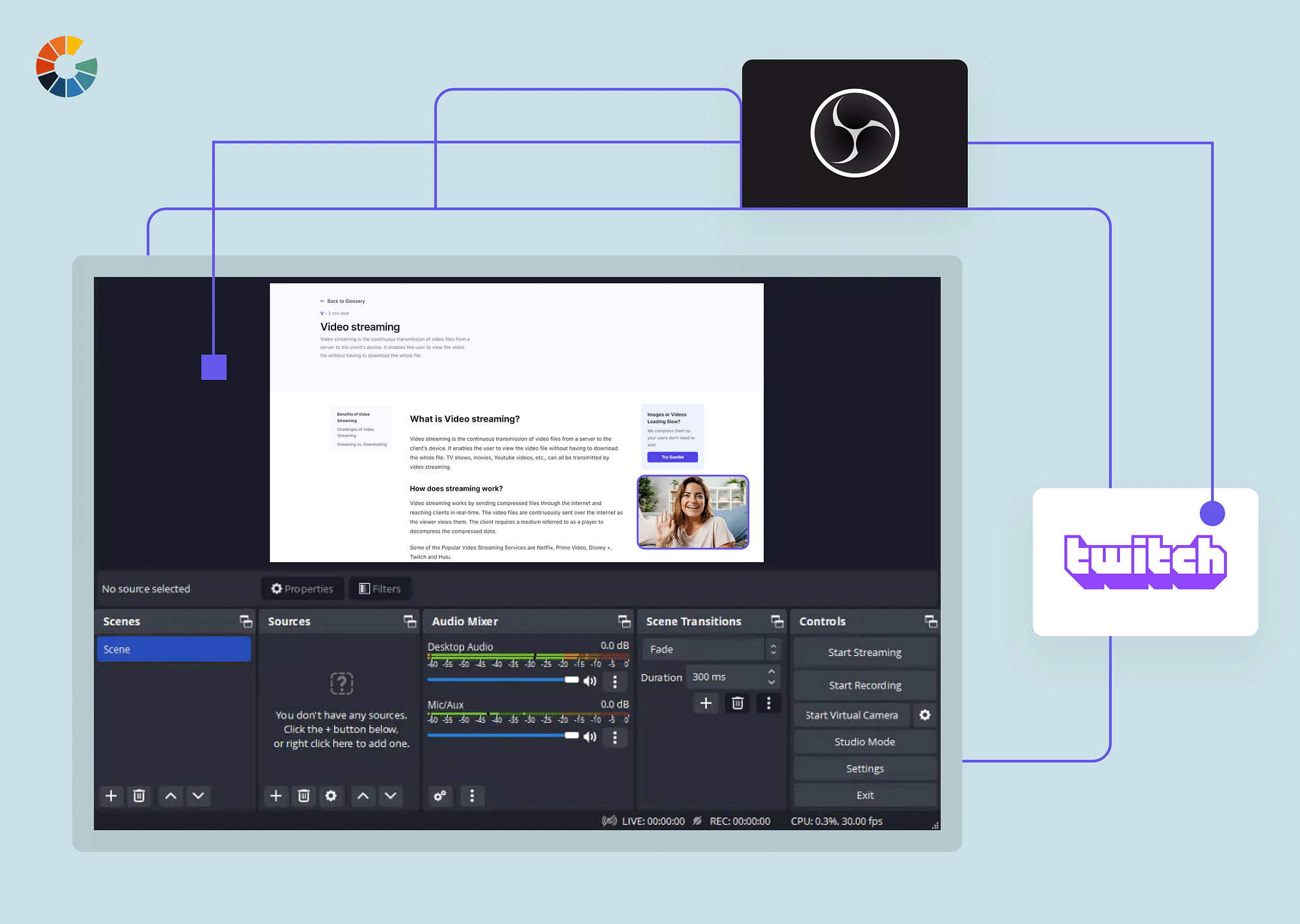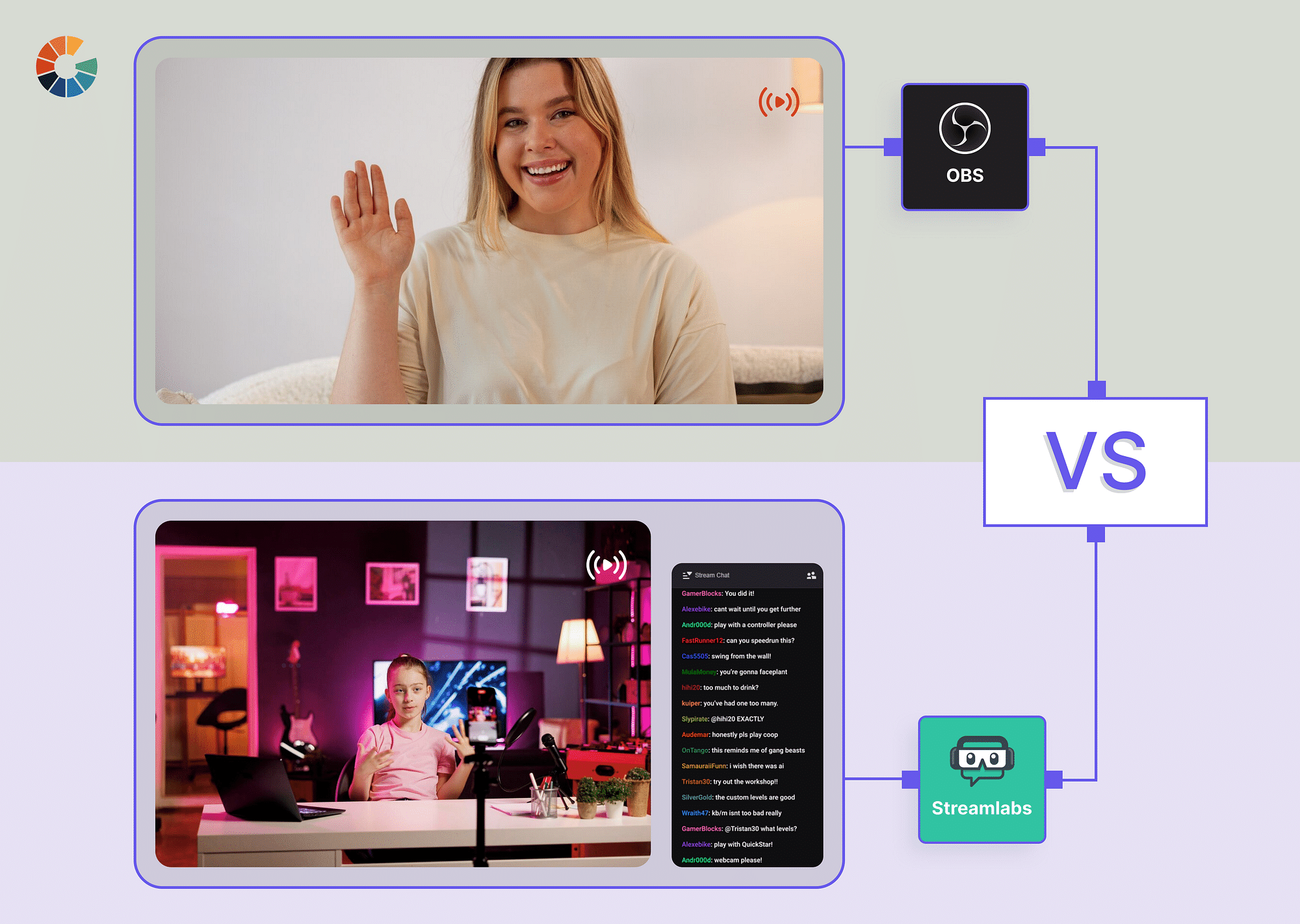HubSpot recently conducted a study that found that 85% of businesses use video content as an effective marketing tool, and 87% use it for internal and external communications. To meet the needs of organizations in today's fast-paced and competitive business climate, the Enterprise Video Platform has become an essential business solution. It enables organizations to streamline live conferences and meetings to fulfill various video-related tasks within an organization.
What is an Enterprise Video Platform?
An Enterprise Video Platform (EVP) is a centralized system that deals with video management for various businesses. It is responsible for creating, managing, storing, and delivering high-quality video content to employees within the company or clients outside the company. The main features of these video platforms include live stream management, video analytics, security, access control, video hosting, and high-end integration capabilities.
EVPs act as a video CMS (Content Management System) capable of creating engaging video content for business functions like employee training, communication, marketing, customer support, and so on. Ultimately, an Enterprise Video Platform is an effective business solution that can help companies manage heaps of data, boost productivity, and improve communication and collaboration with minimal costs incurred.
How is it Different from a Traditional Online Video Platform?
Both Enterprise Video Platforms and Traditional Online Video Platforms (OVPs) offer clients a range of features to manage their video content. However, they share many key differences:
- EVP is designed as a business solution, while OVP is geared toward meeting consumer needs.
- EVP offers additional features like security, access control, and integration for enterprise video content needs.
- EVP is more customizable for clients, allowing modifications to UI, branding, and other specifications.
- EVP is more expensive than OVP due to the host of additional features offered. OVP is more affordable and geared towards direct consumer use.
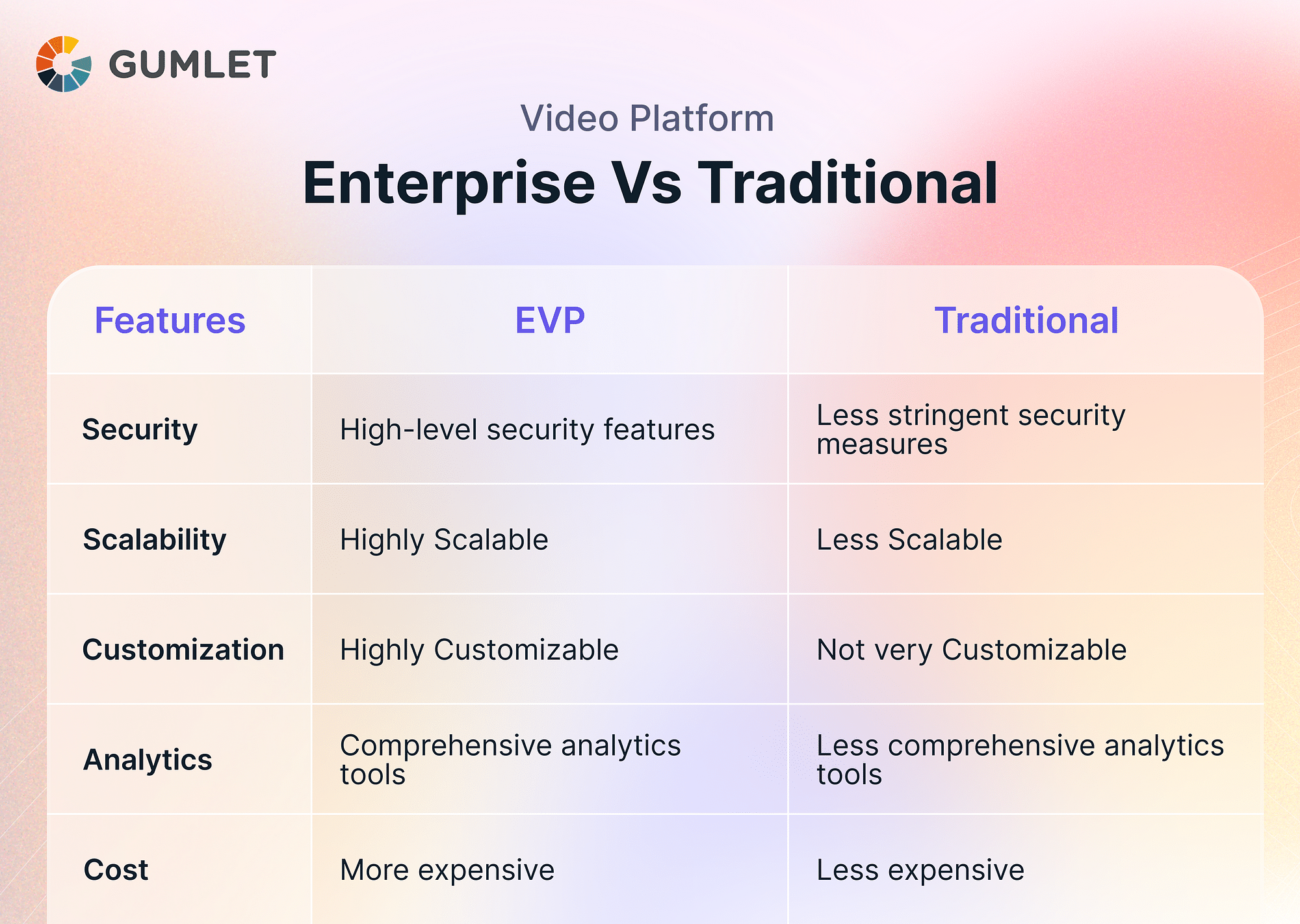
Who can Leverage Enterprise Video Platforms?
Enterprise video platforms can be leveraged by various types of organizations to meet their specific needs. Here's a breakdown:
- SMBs (Small and Medium-sized Businesses): SMBs can use enterprise video platforms for various purposes, such as internal communication, training, product demonstrations, marketing, and customer support. These platforms can help SMBs reach their employees and customers more effectively through video content.
- Enterprises: Large enterprises can benefit from enterprise video platforms for internal communication, training programs, corporate events, town hall meetings, product launches, and marketing campaigns. These platforms offer features like live streaming, on-demand video libraries, analytics, and integrations with other enterprise software.
- Educational Institutions: Schools, colleges, universities, and other educational institutions can utilize enterprise video platforms for online learning, distance education, virtual classrooms, lecture capture, student engagement, and administrative purposes. These platforms can facilitate asynchronous learning, live lectures, discussion forums, and collaboration among students and educators.
- E-commerce Businesses: E-commerce businesses can leverage enterprise video platforms to enhance their product presentations, create video tutorials, conduct live product demonstrations, showcase customer testimonials, and improve the overall shopping experience for customers. Video content can help e-commerce businesses increase sales, reduce product returns, and build brand loyalty.
Why is an Enterprise Video Platform Essential for Your Business?
Enterprise video platforms are essential to sustain businesses that are looking to remain competitive and innovative. Several trends demand installing and implementing a centralized online video management system wherein digital content can be curated and used to boost remote collaboration, communication, marketing returns, etc., to yield better business outcomes. Now that you know the importance of EVPs, let’s discuss the specific benefits of installing one in your company.
Benefits of Enterprise Video Platform
Implementing a well-equipped Enterprise Video Platform system to meet your company's video needs can offer you a lot.
Have a look at some of these benefits:
- Centralized Video Management: EVPs offer a secure, organized way to store, manage, and distribute video content across an organization.
- Video Analytics and Insights: EVPs provide valuable data on who's watching what, engagement levels, and overall video performance metrics.
- Content Security: EVPs offer robust security features such as access controls, encryption, and digital rights management (DRM) to protect sensitive video content from unauthorized access and ensure compliance with data protection regulations.
- Improved Communication: EVPs facilitate seamless communication within organizations through features like live streaming, video conferencing, and on-demand content, enhancing collaboration among teams irrespective of geographical locations.
Use Cases of Enterprise Video Platforms
Enterprise Video Platforms can deal with organizational video management needs on various fronts.
Some of the most common use cases of EVP systems are as follows:
- Corporate Communication: EVPs effectively smoothen an organization's internal and external communication strategies by delivering announcements, updates, etc.
- Human Resource Development & Training: EVPs can create engaging and effective video content for employee training, effectively completing the task without incurring the additional costs associated with on-site training.
- Marketing Strategies: Video content like product demos, customer testimonials, social media content, and promotional videos are key for a company’s marketing campaign. EVPs oversee all of these elements.
- Events and Conferences: EVPs are mainly responsible for effective remote collaboration by hosting live events and video conferences in which participants from different locations can come together and participate.
Features to Consider in Enterprise Video Platforms
Top video platforms provide different features tailored to meet specific business requirements. To get the best out of your investment, you need to be well aware of the capabilities of your EVP systems.
Here’s a list of top features that you should look for when selecting a decent enterprise video platform.
- Video Creation and Management Features: The EVP should be able to create and edit videos. Look for essential tools like screen recording, video trimming & cropping, visual effects, audio adjustments, etc.
- Video Hosting Capabilities: The platform should be well-equipped with features like video storage, categorization, and tagging for efficient hosting.
- Live Streaming Support: The platform should be capable of hosting live streams, conferences, and events and managing and scheduling them.
- Security and Access Features: Maximum security features like encryption and password protection should be included in the system. Moreover, access control functions should be present to prevent unauthorized access to videos.
- Analytics and Tracking Tools: Tools to track video metrics such as views, engagement, and retention rates should be present to allow businesses to measure the effectiveness of their video strategies.
- Customization: The platform should be customizable to communicate brand messages and tailor the interface to meet business goals.
- Mobile Compatibility: The video platform must also be compatible with Android and iOS smartphones to make it more accessible to employees.
- Integration Capabilities: The video platform must be compatible with other enterprise systems and content management systems for maximum efficiency.
Top 5 Enterprise Video Platforms: A Comparison
There are many Enterprise Video Platforms on the market. However, not all of them are designed to meet high-end needs.
To help you with your research, we have shortlisted 5 EVP systems that can help you manage the lifecycle of organizational video content and boost business productivity:
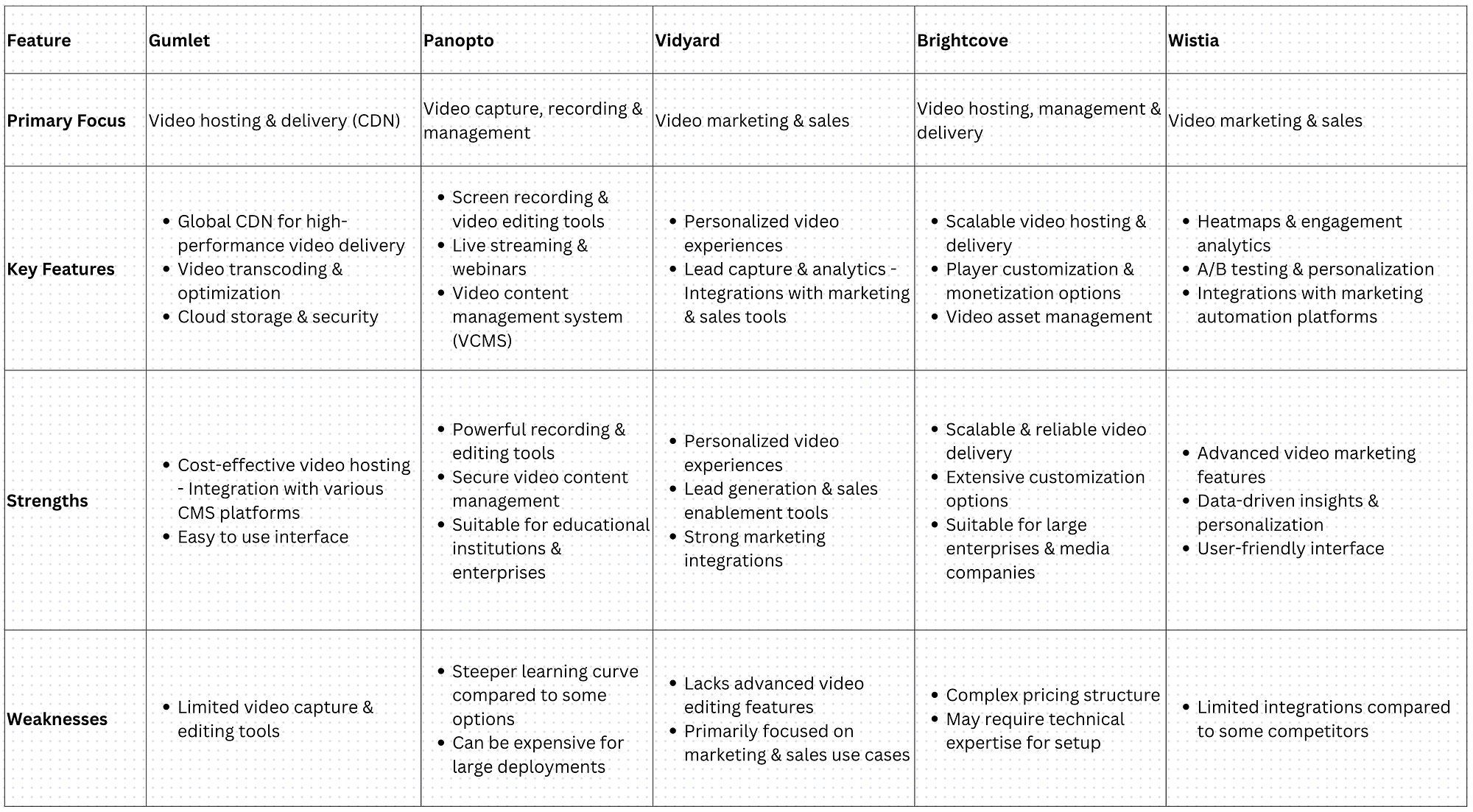
Gumlet
Gumlet is an end-to-end video streaming and image delivery platform designed for enterprises. It enables swift uploading, optimization, hosting, and analysis of videos and images and helps businesses improve their site's UX, SEO, and engagement.
Top Features
- Gumlet enables swift video uploading, hosting, and streaming
- It optimizes videos and images for faster loading, better responsiveness, and higher-quality visuals
- Gumlet Insights provides all the necessary metrics for video engagement.
- Offers best-in-class video transcoding with per-title-encoding and the highest image optimization without quality loss
Panopto
Panopto is one of the most well-equipped Enterprise Video Platforms on the internet. It supports various functions like video hosting, live streaming of conferences and events, recording, and video editing capabilities. The system also has strong integration facilities and mobile support.
Top Features:
- Drag-and-Drop Video Upload
- Interactive HTML5 Video Players
- Video Analytics and Reporting
Vidyard
Vidyard is a highly capable, all-in-one business solution that deals with video hosting, analysis, and messaging capabilities. It has a strong integration capacity and some of the most powerful lead-generation tools in the industry. There are several standout features, and the overall package is not too pricey either.
Top Features:
- Screen recording and Quick Video Editing.
- Password and SSO protection for video content.
- Automatic transcriptions.
Brightcove
Brightcove is a personal favorite of digital marketers because of its strong integration and analytics capabilities. The video management system allows cross-platform analysis and insights into video performance across multiple channels like social media platforms and different websites.
Top Features:
- Cross-platform Analytics and Reporting.
- Video Cloud Studio to manage video workflow.
- Interactive Video Player.
Wistia
Wistia is a cloud-based enterprise video platform that empowers businesses to centralize, manage, and deliver video content effectively.
Top Features:
- Player customization
- Video analytics and insights
- Password protection
Conclusion
Having a proper Enterprise Video Platform can be highly beneficial for your organization. Not only are they capable of creating videos, but they are also responsible for managing the entire lifecycle of organizational video content. With a rapidly increasing demand for making engaging videos for marketing, collaboration, communications, and customer support, the need for installing EVPs is no longer a luxury but a necessity for businesses.
Frequently Asked Questions (FAQs):
1. What is Enterprise Video Content Management?
Enterprise Video Content Management is a collection of tools and technologies for organizing, storing, retaining, and distributing organizational video content through an effective software solution.
2. Is an Enterprise Video Platform economical?
Enterprise Video Platforms are highly economical for businesses in the long run. They can streamline organizational workflows, improve efficiency, and reduce running costs incurred on various fronts, such as employee training, on-site meetings, etc.
3. What is Enterprise Video Streaming?
Enterprise Video Streaming delivers live or pre-recorded organizational video content to employees within the organization. Such streaming events are generally used for employee training, announcements, and other forms of internal communications within a company.
4. What is the largest video distribution platform?
YouTube is currently the world's largest video distribution platform, with over 2 billion monthly active users and millions of video content shared by creators and businesses globally.

